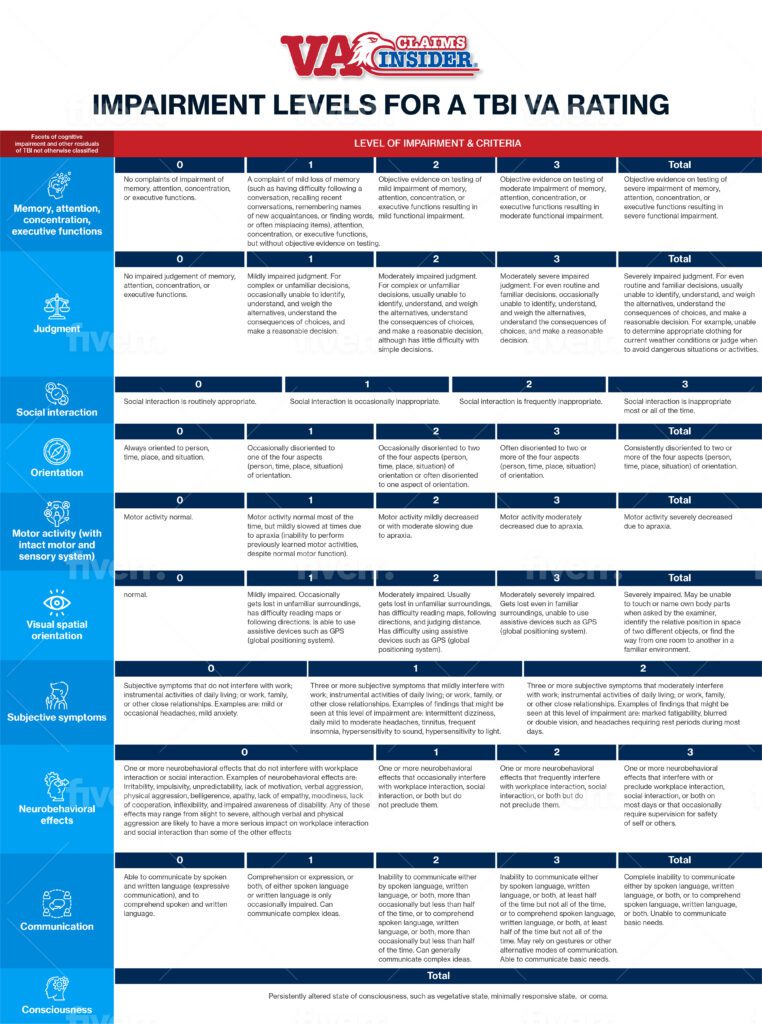Looking for Expert-Level VA Claim Answers?📱Call Us Now! 737-295-2226
In this guide, we’ll explain how to get a TBI VA rating—including how the VA rates TBIs, how to prove service connection, filing a TBI VA claim, TBI Special Monthly Compensation, and more.
TBIs can have a huge impact on a veteran’s ability to lead a normal life, impacting physical and mental function. Pursuing a VA rating for TBI can help you get the care needed to improve your quality of life.
If you’re dealing with a TBI, you may be wondering what your next steps should be. Read on to learn more about TBIs and how to get the highest possible VA rating for TBI based on your symptoms.
Table of Contents

What is a Traumatic Brain Injury (TBI)?
A traumatic brain injury (TBI) is a type of brain injury that occurs when there’s a sudden, violent impact to the head. The injury could be caused by a bump, blow, jolt, or a penetrating head injury.
This kind of impact can cause the brain to bounce around or twist inside the skull, resulting in damage to the brain tissue. Since there are many regions of the brain that govern many different critical functions, TBI’s can result in a wide variety of symptoms and can range from mild to severe.
Deserve a Higher VA Rating?
Book a no-obligation VA Claim Discovery Call with an experienced team member. We’ll review your situation, spot what the VA may have missed, and help you map out a strategy to unlock the VA disability rating and tax-free compensation you’ve earned for your service. Click the red button below to book your call.
TBI VA Ratings
TBI VA Ratings are 0%, 10%, 40%, 70%, or 100%. In addition to these ratings, the VA also offers a special monthly compensation (SMC) for veterans dealing with severe TBIs (more on this SMC below).
The VA rates the residuals of traumatic brain injury with diagnostic code 8045 in the Schedule for Rating Disabilities.
The VA will rate these residual symptoms of your TBI when assigning you a VA TBI rating. Before we break down exactly how the VA rates your TBI, let’s first cover this important term: residual symptoms.
TBI Residuals VA Rating
The VA rates TBIs based on residual symptoms, or lingering symptoms of TBIs that persist for months or even years after the initial injury. The VA will not rate your TBI claim based on the severity of the event that caused the TBI.
TBI residuals may manifest as short-term or long-term physical, cognitive, and behavioral disabilities.

TBI Residuals VA Rating: The VA evaluates TBI residual effects on current levels of mental or cognitive function, emotional and behavioral function, and physical function.
The VA rates conditions in each of these areas of TBI-related dysfunction as follows:
- Cognitive residuals are defined as decreased memory, concentration, attention, and executive functions of the brain. The VA’s process of determining the level of cognitive impairment is complex. It involves evaluating ten facets of TBI-related cognitive impairment. The VA determines the level of impairment for each facet.
- Emotional/behavioral residuals are rated using the General Rating Formula for Mental Disorders in the Schedule for Rating Disabilities.
- Physical residuals, including neurological ones, are evaluated under the specific area of physical dysfunction.
In order to rate your TBI claim, the VA will look at your residual symptoms broken down into these 10 categories:
- Memory, attention, concentration, and executive functions
- Judgment
- Social interaction
- Orientation
- Motor activity
- Visual-spatial orientation
- Subjective symptoms
- Neurobehavioral effects
- Communication
- Consciousness
Each of these categories has up to five different levels of impairment: 0,1,2,3 and total. The TBI VA rating you’ll receive is based on how severe your symptoms are in each category.
The VA equates each level of impairment to these disability rating levels:
- 0 – 0% disability rating
- 1 – 10% disability rating
- 2 – 40% disability rating
- 3 – 70% disability rating
- Total – 100% disability rating
Read the chart below to find out how the VA rates levels of impairment from TBI.
Impairment Levels for a TBI VA Rating

How to Prove a TBI to the VA
It’s much easier for you to get a TBI VA rating if you have documentation of the in-service event or injury that caused your TBI. Examples of documentation include medical records at the time of the event and any military records that prove the traumatic event happened.
Once you have gathered the necessary documentation, you’ll need to file your TBI VA claim. The VA will then determine if you meet the criteria for a TBI rating and award a rating and benefits accordingly.
When to File a TBI VA Claim
Getting your TBI diagnosed is the first step to filing a VA claim.
Filing a TBI VA Claim
To file a VA claim for a TBI, you’ll be required to prove these three elements:
- You have a current medical diagnosis of a TBI
- Your TBI was caused by a traumatic event during your military service, AND
- You have a medical nexus that links your TBI to the trauma
While there is no cure for TBI, early intervention and treatment can help to minimize the long-term effects of the injury. TBI symptoms often get worse over time and can increase the risk of developing mental health problems and nervous system diseases.
Getting treatment as early as possible is important, which is why you should file a TBI claim and get access to VA healthcare for TBI treatment as soon as possible.
(VIDEO) Win Your TBI VA Claim!
Special Monthly Compensation for TBI (TBI SMC)
Sometimes, TBI is so severe that veterans require more care than they’re able to give themselves. Veterans eligible for Aid and Attendance may be eligible for significantly increased monthly compensation in the form of special monthly compensation for TBI (SMC-T).
(The Aid and Attendance benefit is a monetary benefit that helps eligible veterans and their surviving spouses pay for the assistance they need in everyday functioning.)
In addition to being eligible for Aid and Attendance, you must prove that you’d require higher-level institutional care (care in a hospital, institution, or nursing home) if you didn’t receive in-home care.
You can demonstrate a need for Aid and Attendance by proving you need help performing daily activities, including:
- Bathing and keeping yourself clean and presentable
- Feeding yourself
- Dressing yourself
- Going to the bathroom

TBI Symptoms
Most veterans experience mild symptoms after experiencing a TBI, but sometimes symptoms can be incapacitating. You could be dealing with cognitive deficits, changes in mood and behavior, sleep disturbances, headaches, or chronic pain. TBIs can also lead to employment, relationships, and financial stability problems.
The VA classifies typical symptoms of TBIs that may develop within 30 days of head trauma into three different categories: physical symptoms, cognitive symptoms, and behavior or emotional symptoms.
Physical symptoms may include:
- Headaches
- Dizziness
- Balance disorders
- Nausea
- Fatigue
- Sleep disturbance
- Blurred vision
- Sensitivity to light
- Hearing loss
- Tinnitus
- Sensitivity to noise
- Seizures
- Numbness or tingling
Cognitive symptoms may include problems with:
- Attention
- Memory
- Concentration
- Speed of processing
- Judgment
Behavioral or emotional symptoms may include:
- Depression
- Anxiety
- Agitation
- Irritability or mood swings
- Impulsivity
- Aggression
Everyone experiences TBI symptoms differently. The effects of a TBI differ based on age, the severity of the damage, and whether or not you’ve had a previous brain injury. Not all of these may affect you, and some functions may be affected more severely than others. The severity of your symptoms may also fluctuate from day to day.
Generally, a more severe TBI will tend to produce more severe symptoms. But even a mild TBI can have an impact on a veteran’s social, emotional, cognitive, or physical health.
How to Prove Service Connection for TBI
If you’re a veteran seeking service connection for a TBI VA rating, it’s important to have all the necessary documentation in order. This includes all the details surrounding the date and time of the event, any medical care you received when the event happened or afterward, how your condition changed over time, and how the event affected your concentration, memory, judgment, and overall mental state.
Including documentation of possible events that caused your TBI will help prove service connection. Any records that show you were involved in combat or training exercises can help strengthen your case.
This could include service personnel records, service treatment records, military performance reports, unit and organization histories, daily staff journals, operational resorts-lessons learned (ORLLS), after-action reports (AARs), radio logs, deck logs, ship histories, and monthly summaries and morning reports. A personal statement can also help prove your claim.
You will also need your documentation regarding your medical diagnosis. An independent medical opinion is extremely valuable for all VA claims and very important for a TBI claim.
TBI Diagnosis and TBI Residuals
TBIs are diagnosed as mild, moderate, or severe based on medical testing and the severity of your symptoms. Residual symptoms of mild TBIs usually resolve within about six months after the injury—but not always.
Residual symptoms of more acute TBIs can be long-lasting, permanent, or may take years to manifest (e.g. Parkinson’s disease, dementia).
Mild TBIs (mTBIs) are also sometimes called concussions.
The VA uses four different criteria to determine whether your initial diagnosis of TBI is mild, moderate, or severe.
Structural Imaging
CT scans are typically used to help diagnose TBIs. However, even a veteran experiencing a severe TBI can have normal imaging. Abnormal imaging is classified as either moderate or severe.
How long you lost consciousness
The VA rates severity by:
- Mild – up to 30 minutes
- Moderate – between 30 minutes and 24 hours
- Severe – more than 24 hours
Your Mental State
Your altered mental state must be a result of the trauma. Symptoms include looking and feeling dazed, uncertain about what is happening, general confusion, difficulting thinking clearly or responding appropriately, and an inability to describe events that happened right before or after the traumatic event. The VA rates these symptoms of severity by:
- Mild – if the symptoms subside within 24 hours
- Moderate or severe – if the symptoms last longer than 24 hours
Length of State of Confusion
Also called post-traumatic amnesia, this is the state of confusion and disorientation that happens immediately following a TBI. The VA rates severity by:
- Mild – up to one day
- Moderate – between one and seven days
- Severe – more than seven days
Although it can be helpful to understand how the VA arrived at the level of severity of your original TBI diagnosis, the initial severity of the traumatic event or of your diagnosis is not the standard that the VA uses to arrive at your TBI VA rating. Instead, the residual effects of the trauma affect the rating. Read on below to learn more about how this is assessed.
Will the VA Rate TBI and PTSD Separately?
Minnesota VA researchers found that veterans who’ve experienced a TBI are at a higher risk of developing PTSD, depression, and anxiety. Veterans with a TBI are also likely to develop more severe PTSD symptoms.
How the VA rates TBI and PTSD disabilities depends on the circumstances. Most of the time, you’ll receive separate ratings for each. Often, PTSD may be considered a secondary service-connected disability to TBI.

However, if you’re dealing with both and experiencing the same symptoms as a result, you could be given one combined rating for both disabilities.
The most common instance of receiving a combined PTSD and TBI VA rating is if your TBI results in only emotional or behavioral symptoms similar to the symptoms of PTSD. If your TBI results in cognitive or physical symptoms (or both), the two disabilities will likely be rated separately.
You can learn more in our post on how to prove you have combat PTSD.
Is TBI a Presumptive Disability?
No. TBI is not in and of itself a presumptive disability, meaning you must prove the nexus, or link, between your TBI and an event, illness, or injury resulting from your service.
However, once you’ve been diagnosed with a moderate or severe TBI, there are several disabilities the VA presumes are caused by your TBI. These five presumptive disabilities are:
- Parkinson’s disease
- Dementia that develops within 15 years
- Depression within three years (or within 12 months of a mild TBI)
- Hormone deficiency diseases within 12 months
- Seizures
If these conditions appear within the timeframes listed above, you may be eligible to file for secondary service connection to your rated TBI. If there is evidence that these conditions are caused by something other than your TBI, you won’t be eligible for secondary service connection.
When considering the above, raters will look at how the TBI has impacted your life, including your work and personal relationships. Some veterans are unable to work due to the severity of their symptoms. There are typically the TBI claims that are assigned the “total” or 100% rating.
Some categories don’t include the option for a 100% TBI rating. In this case, even if you’re not eligible for a 100% TBI VA rating, you may still be eligible for a Total Disability Individual Unemployability rating.
Why a Traumatic Brain Injury VA Rating Can be Complicated
Winning a TBI VA claim can be tricky because it isn’t a distinct disability in and of itself. It’s a cluster of disabilities or symptoms resulting from a single event. And since TBIs often involve multiple symptoms, the VA’s “pyramiding” rule, which discourages applying multiple diagnostic codes to a single symptom, has to be considered. The VA may even make an error assuming pyramiding when it’s not the case.
Make sure you get help if you need it to mount the most complete claim and get the TBI VA rating you deserve. Take advantage of a VA Claim Discovery Call to see how we can the the pain out of your VA claim.
What caused the recent increase in TBIs among OIF/OEF Veterans?
TBIs are affecting an increasing number of veterans who have more recently served. The VA estimates that 22 percent of all combat-related casualties sustained by troops in Iraq and Afghanistan are brain injuries. That’s a 10 percent increase from rates among Vietnam War veterans.
Researchers at the University of Texas found that 17.5% of post-9/11 veterans have experienced mild TBI, with an additional 3% suffering from moderate to severe TBI.
Another study found that nearly 4,000 more 9/11 veterans died in the past 20 years than anticipated, and those numbers were highest in veterans with any level of TBI.
Roadside Improvised Explosive Device (IED) attacks, firebombs, and other explosives are among the leading causes of recent veteran combat-related TBIs, resulting in penetrating injuries from shrapnel as well as blast injuries.
NEED MORE ASSISTANCE?
Most veterans are underrated for their disabilities and, therefore not getting the compensation they’re due. At VA Claims Insider, we help you understand and take control of the claims process so you can get the rating and compensation you’re owed by law.
Our process takes the guesswork out of filing a VA disability claim and supports you every step of the way in building a fully developed claim (FDC).
If you’ve filed your VA disability claim and have been denied or have received a low rating—or you’re unsure how to get started—reach out to us! Take advantage of a VA Claim Discovery Call. Learn what you’ve been missing—so you can FINALLY get the disability rating and compensation you deserve!
We’ve supported more than 25,000 veterans to win their claims and increase their ratings. NOW IT’S YOUR TURN.
About the Author

Trisha Penrod
Trisha Penrod is a former active-duty Air Force officer. As an Intelligence Officer, she led teams of analysts to apply advanced analytic skills to identify, assess, and report potential threats to U.S. forces.
Trisha attended the U.S. Air Force Academy and holds an MBA from Webster University. After receiving an honorable discharge in 2018, Trisha worked as a growth marketer and utilizes her analytic skills to help others accomplish their business goals.



